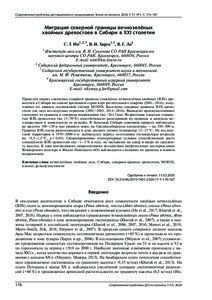Migration of the northern evergreen needleleaf timberline in Siberia in the 21st century
URI (для ссылок/цитирований):
http://jr.rse.cosmos.ru/article.aspx?id=2125&lang=enghttps://elib.sfu-kras.ru/handle/2311/142353
Автор:
Im, S. T.
Kharuk, V. I.
Lee, V. G.
Коллективный автор:
Институт экологии и географии
Кафедра географии
Дата:
2020-03Журнал:
Sovremennye Problemy Distantsionnogo Zondirovaniya Zemli iz KosmosaКвартиль журнала в Scopus:
Q3Библиографическое описание:
Im, S. T. Migration of the northern evergreen needleleaf timberline in Siberia in the 21st century [Текст] / S. T. Im, V. I. Kharuk, V. G. Lee // Sovremennye Problemy Distantsionnogo Zondirovaniya Zemli iz Kosmosa. — 2020. — Т. 17 (№ 1). — С. 176-187Текст статьи не публикуется в открытом доступе в соответствии с политикой журнала.
Аннотация:
An analysis of the shift of the northern boundaries of closed evergreen coniferous (EGC) stands in Siberia was carried out based on the time series of vegetation cover maps (2001-2016) obtained from MODIS satellite imagery data. The northern boundaries of the EGC for two studied periods (2001-2003 and 2014-2016) were identified. Mostly, a shift of the EGC boundary in the north direction (by ~26±2 km) was revealed. An increase in the area of the closed EGC stands (by 15-50 %) contributed to the expansion of their boundaries was not uniform depending on the relief. In Western Siberia, the increase mainly was observed at altitudes of 100-130 m above sea level, and on the Central Siberian plateau - at 350-500 m. The EGC boundary locates in the zone of mean summer temperatures 12-15 °C. In the study area in 1970-2000s, a warming period was observed (temperatures increased by ~0.5-1.5 °C, p < 0.05). The given temperature regimes facilitated an increase of closure of the EGC stands (by ~1-3 %/year), their expansion to the north, and upward along the elevation gradient. In the zone of intensive anthropogenic impact (oil and gas fields of the Vankor cluster and the Yamalo-Nenets Autonomous Area), a shift of the EGC boundary to the south was observed. © 2020 Space Research Institute of the Russian Academy of Sciences. All rights reserved.

